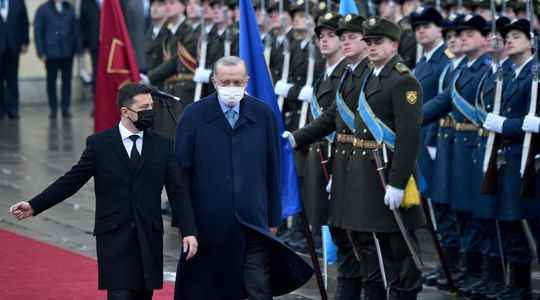Until now, Moscow seemed the perfect plan B for Recep Tayyip Erdogan. In recent years, as Turkey has moved away from its NATO allies and from the prospect of European Union (EU) membership, the Turkish president has striven to develop good relations with the Kremlin . He went so far as to buy Russia’s S-400 air defense system in 2017, at the cost of heavy US sanctions and Ankara’s expulsion from the F-35 latest-generation fighter jet program.
But the invasion of Ukraine, a country with which Ankara has excellent relations, has made this policy of balance between Russia and the West untenable. “In this context of extreme tensions and the return of a form of Cold War, Turkey will again choose the Western camp, it is very clear”, affirms Sinan Ülgen, former diplomat and director of the Istanbul think tank Edam .
Turkish drones, a major asset of Kiev
While the European Union has just announced the financing and delivery of 450 million euros of military equipment to Ukraine, Ankara could provide new combat drones to Kiev. Ukraine already has around twenty Turkish military drones, Bayraktar TB2 models produced by the company of the same name and headed by President Erdogan’s son-in-law. A partnership between the defense industries of the two countries had even emerged, in particular concerning the production of motors for drones by Ukrainian companies. The Ukrainian Ministry of Defense has also welcomed the presence of these drones in its inventory by broadcasting, on February 27, on the social network Twittervideos of drone strikes against Russian armored columns, accompanied by a message in Turkish.
On Monday, February 28, the Turkish Foreign Minister, Mevlüt Çavusoglu, even hinted that he intended to close the Bosphorus Strait to the Russian navy, as Kiev has demanded since the start of the invasion. The control of the strategic straits of the Bosphorus and the Dardanelles, the only passages which connect the Mediterranean Sea to the Black Sea and the Sea of Azov, is indeed left to the appreciation of Turkey, within the limits of the Montreux Convention. (1936). “We are going to apply the convention. Even if Turkey is not a party to the conflict, it has the right to close access to warships crossing the Bosphorus in the event of war, unless they use it to return their bases,” Çavusoglu said.
A decision to close the straits to Russian ships would have limited immediate consequences, Russia having already brought a substantial part of its fleet to the Black Sea before the start of the offensive, but the symbolic impact would be major: Moscow could react against the Turkey, particularly on one of the geopolitical issues that has pitted it against Ankara in recent years, starting with Syria. “The Turkish government is worried that Moscow will, for example, give the green light to an offensive by the Assad regime in the province of Idleb”, analyzes Sinan Ülgen about this region located in the north-west of the country and dominated by Islamist rebels close to Ankara.
Fear on the Turkish economy
Turkey, which is going through a serious economic crisis characterized by high inflation, risks finding itself even more weakened by the conflict. Its energy sector is indeed highly dependent on Russia, from which it imports gas on a massive scale, while Moscow is helping to build the country’s first nuclear power plant.
Ankara also depends heavily on Russian grain imports, when Russia is proving to be an essential buyer for Turkish fruits and vegetables. Likewise, Russian tourists represent Turkey’s main tourist windfall, with 4.5 million visitors last year. Annual imports from Russia amount to nearly $29 billion, meaning a Turkish boycott would hit the Russian economy hard, but would also be tantamount to Ankara shooting its fragile economy in the foot.
By espousing the condemnations of the Russian invasion formulated by his NATO allies, Erdogan intends to benefit from the dividends of his rallying. On the geopolitical level in particular, the attacks by Turkish troops and their Islamist mercenary allies against the Arab-Kurdish forces of the Syrian Democratic Forces (in 2018 and 2019) had moved European capitals. In 2020, the demonstrations of force by the Turkish navy against Cyprus and Greece in the eastern Mediterranean had earned Ankara strong reprimands from Washington. “In this new context of crisis, the geostrategic importance of Turkey will increase in the eyes of the Americans, and this could pave the way for better relations between the two countries,” said Sinan Ülgen. As often, Erdogan finds himself on a ridge line.
